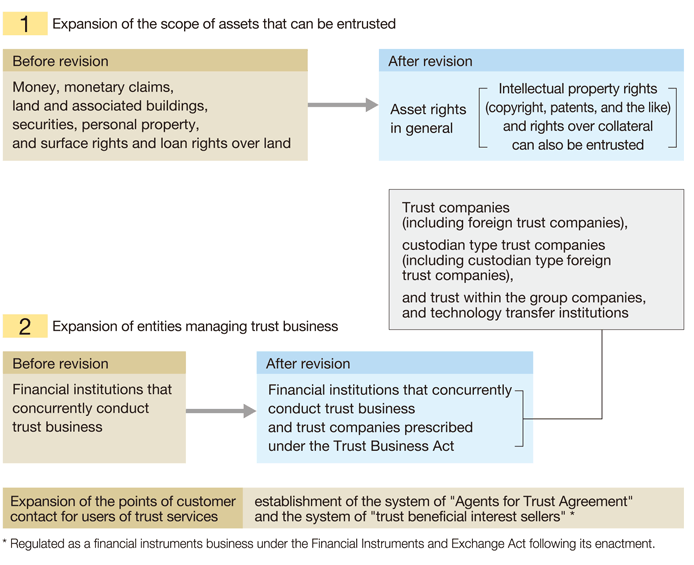Main points of the Trust Business Act Amendment (2004, 2006)
1. 2004 amendments
Radical amendments to the Trust Business Act were made in December 2004, preceding the 2006 amendments. Such amendments promoted increased competition because of the increase in new managers of trusts, and they expanded the scope of trusts to diversify into trust property such as intellectual property rights.
Highlights of the amendments

2. Amendments to the Trust Business Act due to the 2006 amendments to the Trust Act
The Trust Business Act was amended as per the 2006 amendments to the Trust Act. The main changes were as follows:
Duties of the trustees and others

- Under the new Trust Act, the trustee's duty of care of a prudent manager, duty to segregate property, and so on could, in principle, be reduced by the contract between the parties, but the trustee's obligations remain essentially unchanged under the Trust Business Act. However, revisions to the scope could occur if they did not undermine the protection of the beneficiary. For example, movable assets, securities, and other assets do not necessarily have to be physically separated as long as they are separately managed in the accounting book.

- If a trustee delegates trust business to a third party, the delegated person is directly responsible for duties such as the duty of care of a prudent manager in the same manner as the trustee, as has essentially always been the case (excluding cases such as when the business of the person delegated relates only to custodianship of trust property). In addition, a trustee incurs severe liability for damages resulting from the behavior of the delegated person (except when the settlor or the beneficiary designates the persons concerned).
Regulations pertaining to new types of trusts (declaration of trusts)

- The settlor and the trustee are one and the same in a declaration of trust, necessitating additional regulations beyond the scope of a normal trust to protect the beneficiary, such as reviews by lawyers, a certified public accountant, and licensed tax accountant to ensure that the establishment of the trust is genuine.

- A declaration of trust is subject to the regulations of the Trust Business Act when there are at least 50 beneficiaries (including effective beneficiaries).
- *
- A supplementary resolution by the Committee on Judicial Affairs for both houses of parliament concerning the 2006 Trust Act urges the government and others to consider social welfare-related trusts that support the livelihood of the elderly and disabled from a wide perspective, including the participation of lawyers and NPOs in the management of such trusts.
Major points of Trust Act Amendments (2006) | Main points of the Trust Business Act Amendment (2004, 2006)







